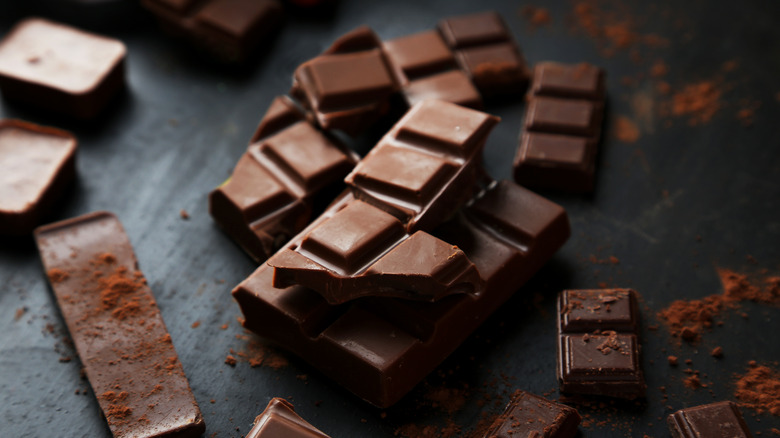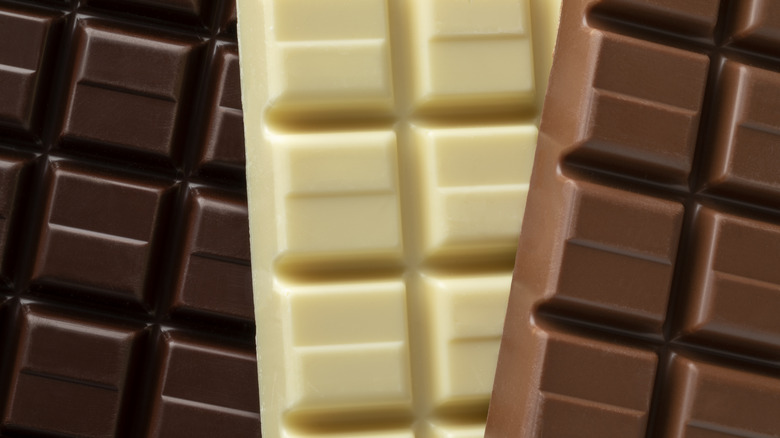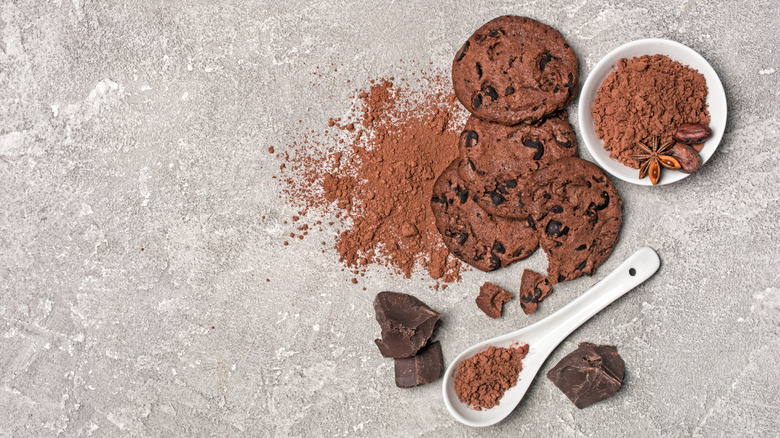Does Chocolate Expire?
We've all asked the question at some point, possibly while sorting leftover Halloween, Christmas, and Easter candy — does chocolate expire? It's one of those things that's usually grouped with foods like beans and rice as something that cannot go bad over time. But the truth is that chocolate does expire, and depending on the type (milk, dark, white) and form (bar, powder, chip), it can have an even shorter shelf life than we might expect.
In general, dark chocolate lasts longer than milk and white chocolate due to its ingredients. For any chocolate, it's important to look out for warning signs of spoilage. One thing to look out for is white spots or sugar bloom; while not harmful to eat, this dry, white film caused by moisture can change the taste or texture in a negative way. Other things to look out for are a rancid, musty, or savory smell, sour-tasting chocolate, and mold. Most varieties of chocolate should be stored in a cool, dry place at room temperature, and never in the fridge, as this can breed sugar bloom. It's also important to note that higher-quality chocolates are usually made with fresher ingredients and fewer preservatives and will therefore go bad faster.
Types of chocolate and their shelf life
Milk chocolate has a much shorter shelf life than dark chocolate, and it's good for around six months to one year. This is due to the difference in ingredients, the most important of which is right in the name: milk. According to the Food and Drug Administration (FDA), milk chocolate must contain at least 10% chocolate liquor and 12% milk solids; in layman's terms, milk chocolate usually contains an amalgamation of sugar, milk powder, cocoa nibs, and butter, and an emulsifier, usually a lecithin.
White chocolate (which, in case you're wondering, is real chocolate) is similar in terms of shelf life, at about four months to one year. This is also because of the ingredients, which by FDA standards must contain at least 20% cocoa butter, 3.5% milkfat, 14% milk solids, and less than 55% sugar/caloric sweetener. Due to the increased milk products in white chocolate, it has a slightly shorter shelf life.
Dark chocolate is the longest-lasting of the three, as it can usually last for as long as two years if stored properly. The FDA does not regulate dark chocolate specifically, but it must adhere to the standards of "chocolate," which means it can't contain any artificial chocolate flavors and must contain only natural ones from cacao beans. These natural, pure flavors lead to a longer shelf life.
Powdered chocolate and chocolate chips have their own shelf lives too
Powdered chocolates, including "natural" or unsweetened varieties, can last for up to three years unopened, and at least one year, maybe more if stored properly, once opened. These powders are typically derived from roasted cacao beans that have had their cocoa butter mostly removed for use in other products; the resulting product is bitter and strong. White chocolate powder is much less common; it's not easy to find information on it, but the Ghirardelli version supposedly lasts up to one year.
To get the most out of your chocolate powders, be sure to store them in a cool, dry space in an airtight container. When using powders, use a clean utensil to avoid introducing moisture. If you're worried your chocolate powder has gone bad, check for discoloration or mold, a rancid or stale smell, and a musty or bland taste. Overall, cocoa powder is unlikely to spoil, but over time it will become less potent.
Chocolate chips can also be used after the expiry date, but the quality may be reduced. Dark chips can last up to three years, while milk chocolate chips last around one year and white chips only last about six to nine months; this difference is due to the higher content of dairy in the latter two, which makes them slightly more perishable. No matter the flavor, watch for signs of spoilage, including sugar bloom, discoloration, changes in texture (grainy), and rancid or unpleasant smells. Be sure to store all chocolate chips properly in an airtight container at room temperature.


